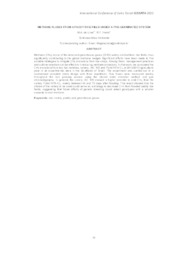Methane fluxes from a paddy rice field under a pre-germinated system.
Methane fluxes from a paddy rice field under a pre-germinated system.
Author(s): LIMA, M. A. de; VIEIRA, R. F.
Summary: Methane (CH4) is one of the dominant greenhouse gases (GHG) widely emitted from rice fields, thus significantly contributing to the global methane budget. Significant efforts have been made to find suitable strategies to mitigate CH4 emissions from rice crops. Among them, management practices and cultivar selection can be effective in reducing methane emissions. In this work, we compared the CH4 emissions from two rice varieties, namely, IAC 105 and Puitá INTA-CL at 2012/2013 agricultural year in an experimental area in the Southeast of Brazil. The experiment was carried out in a randomized complete block design with three repetitions. Gas fluxes were measured weekly throughout the rice growing season using the closed static chamber method and gas chromatography. In general, the variety IAC 105 showed a higher potential to emit CH4 than the variety Puitá INTA-CL, mainly between 46 and 76 days after flooding. This result showed that the choice of the variety to be used could serve as a strategy to decrease CH4 from flooded paddy rice fields, suggesting that future efforts of genetic breeding could select genotypes with a smaller capacity to emit methane.
Publication year: 2022
Types of publication: Abstract in annals or event proceedings
Unit: Embrapa Environment
Keywords: Greenhouse gases, Metano, Paddy soil, Rice, Rice variety
Observation
Some of Embrapa's publications are published as ePub files. To read them, use or download one of the following free software options to your computer or mobile device. Android: Google Play Books; IOS: iBooks; Windows and Linux: Calibre.
Access other publications
Access the Agricultural Research Database (BDPA) to consult Embrapa's full library collection and records.
Visit Embrapa Bookstore to purchase books and other publications sold by Embrapa.

